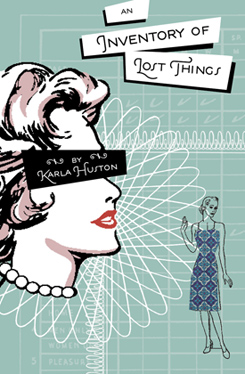Book Review
An Inventory of Lost Things by Karla Huston, Centennial Press, 2009. $8
Reviewed by Lester Smith
Karla Huston is one of the subtler poets you’ll find. I’ve heard her featured at readings a few times now, and her delivery is understated. While I’ve chuckled at clever turns of phrase each time and nodded at astute observations, it wasn’t until seeing her poems arranged in one place that I realized just how much I had missed while listening. Blame it on my thick-headedness, but reading An Inventory of Lost Things finally opened my eyes to the coy wisdom lurking under the surface of Huston’s seemingly straightforward language.
An Inventory of Lost Things contains 23 of Huston’s poems, tastefully packaged by Centennial Press in that publisher’s always-exceptional graphic fashion. The cover has an innocent 1950s feel, in keeping with several of the poems within, but with just enough edginess to suggest a metaphorical “Beware of Dog” sign in a white-picket-fenced suburban yard. For example, the “By Karla Huston” block is set like a black blindfold squarely across the eyes of the lipsticked housewife on the cover. I’ll leave you to investigate for yourself the remaining subtle tensions of the graphic design.
The chapbook opens with an epigraph from Philip Larkin’s “High Windows” that I’m not sure is entirely appropriate for Huston’s verse. So much of Larkin is drearily sad (he said he believed sadness was the state of most people), and while Huston sees through the veneer of human manners as well as he, her work could never be considered dreary. She has a Midwesterner’s sense of rootedness and a good humor that belie Larkin’s loneliness and wry cynicism.
Consider Huston’s opening poem, “The Girl with God on Her Pants,” which begins with “I almost said ‘in’ her pants / but this isn’t that kind of poem . . .” The piece goes on to describe a sort of sixteen-year-old we’ve all known (perhaps have been), already engaged, innocently proclaiming her love of Jesus in sequins and paint on ragged jeans that her fiancé is dreaming to take off her. For, as the poem ends, “He believes in his right / to all things holy.” As the opening of this poem reveals, Huston isn’t above referring to herself directly, reminding us that the poet is immediately present. With that established, she consciously delivers puns like the one embedded in this poem’s end. Behind the poem’s effervescent delivery, however, lurks the image of the naïve girl herself, a human shopping list of details that reflects painfully on a blithe American Protestantism.
Granted, we might read this first poem and miss any suggestion of depth beyond the picture as presented. That poem being followed by “The Good Dog,” however, Huston’s mastery at wrapping a weighty supposition within a seemingly simple image becomes undeniable. This poem presents a straightforward picture of a man and his dog, a bitch, playing catch. The trouble is that he has thrown her a snowball to chase, and it’s indistinguishable from the snow all around. Her painful confusion is so palpable—she wants only to please—and Huston marries this to a suggestion of his smug superiority, leaving us to hate the subservient relationship even as we identify with it. Now go back and read “The Girl with God on Her Pants,” with its own possessive closing lines, and the suggestion of depth expands.
While the jazzy “Totally Devoted” continues in this vein of perhaps unhealthy dependency, “Walker,” “The One on the Left,” and “Your Marie” all seem to reveal with comfort the recognition of a partner’s sexual attraction to other people. It is the comfort of a confident Midwestern relationship, unthreatened by memories from the past, however present they may be, nor by the attractive young person currently strolling by. (Again, this is a confidence I doubt Larkin could have ever mustered.) From there, Huston moves on to a poignant poem of marriage to a dog catcher, then to a more sinister one about marriage to a plastic surgeon, and on through poems about 1950s movie romances, housewives lost in that time, feral cats mating outside the poet’s window, and so on to poems about the wind, trees, bees, flies, and ripe tomatoes, to name just a few.
In the end, the collection delivers us to a set of poems embodying lists. Some are wistful, such as the final poem, from which the collection takes its name. But it is the next-to-last poem, “Dogma for the Junk Drawer,” that I believe best portrays this poet’s innate sense of hope that I’ve spoken of earlier, a hope Larkin could merely hint at in the final lines of his “The Whitsun Weddings,” and then only as something observed in other, simpler lives. Huston knows this hope personally and embraces it despite her reportage of pain and folly elsewhere in the book. “I believe there is a way / to fix what is broken . . . ,” she says, “a way to make use / of the useless. I believe if you dig deeply, / you will find what you need.” It is that confident hope that makes this chapbook more of a positive “inventory” than a grieving for things lost.
Lester Smith is an award-winning writer, game designer, and poet who works as a writer and technologist for Sebranek Inc., an educational publishing house in southern Wisconsin. He is also the current president of the Wisconsin Fellowship of Poets. As time permits, he publishes other writers via Popcorn Press.


